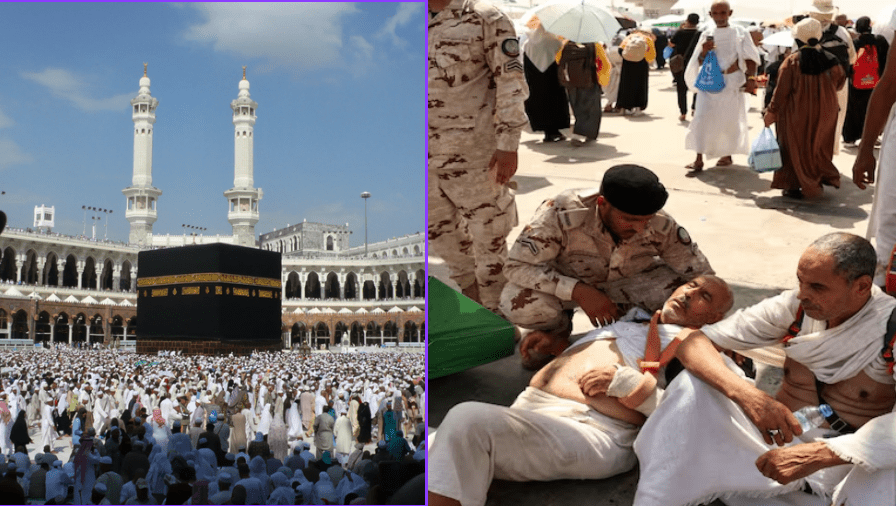Over 1,000 Deaths During This Year’s Hajj Amid Sweltering Heatwave in Saudi Arabia!

As parts of Asia continue to experience extreme heat, a tally by AFP indicates that over 1,000 people have tragically lost their lives during this year’s Hajj in Saudi Arabia. The report reveals that more than half of the deceased were unregistered worshippers who braved the pilgrimage in blistering temperatures.
Unprecedented Heatwave in Saudi Arabia and Unregistered Pilgrims
The recent deaths reported on Thursday include 58 from Egypt, as confirmed by an Arab diplomat. A detailed breakdown shows that out of the 658 Egyptians who died, 630 were unregistered pilgrims. This startling statistic highlights the perilous conditions faced by those who undertook the pilgrimage without official registration.
In total, around 10 countries have reported 1,081 deaths during the annual pilgrimage, a vital religious duty for Muslims worldwide. These figures were compiled from official statements or from diplomats engaged in their countries’ responses, as reported by AFP.
Timing and Climatic Challenges
The hajj’s dates are determined by the lunar Islamic calendar, and this year it coincided with Saudi Arabia’s intensely hot summer. Earlier this week, weather agencies reported temperatures exceeding 51 degrees Celsius in the Grand Mosque in Mecca. According to a recent Saudi study, temperatures in the region are rising by 0.4 degrees Celsius each decade, exacerbating the already harsh conditions.
While Saudi authorities cleared hundreds of thousands of unregistered pilgrims from participating, reports indicate that many still joined the pilgrimage without the necessary permits. These unregistered pilgrims lacked access to air-conditioned areas and other essential facilities, making them particularly vulnerable to the severe heatwave.
The Struggles of Unregistered Pilgrims
“People were exhausted after being chased by security forces before Arafat day. They were already worn out,” one Arab diplomat told AFP, referring to the day-long outdoor prayers that mark the climax of the hajj. This exhaustion, coupled with the oppressive heat, proved deadly for many.
The primary cause of death among the pilgrims was the extreme heat, which led to complications such as high blood pressure and cardiovascular issues. The heat also exacerbated existing health problems, proving fatal for many who were already in a weakened state.
A Global Tragedy in Saudi Arabia
In addition to Egypt, fatalities have been confirmed by several countries, including Malaysia, Pakistan, India, Jordan, Indonesia, Iran, Senegal, Tunisia, and Iraq’s autonomous Kurdistan region. However, in many cases, the specific causes of death have not been disclosed by the authorities.
The Human Toll of Extreme Conditions
This year’s hajj has underscored the profound impact of climate conditions on human health, particularly during large-scale events like religious pilgrimages. The sweltering heat not only posed a direct threat to the pilgrims but also highlighted the broader issue of climate change and its accelerating impact on vulnerable populations.
The Plight of Unregistered Pilgrims
Unregistered pilgrims, who did not have access to the amenities and protections available to registered participants, bore the brunt of the heatwave. Their lack of permits meant they were often excluded from air-conditioned shelters and medical facilities, leaving them exposed to the harsh elements. This lack of access significantly increased their risk of heat-related illnesses and complications.
The Role of Authorities
While Saudi authorities made efforts to manage the situation by clearing unregistered pilgrims, the sheer number of participants made it challenging to enforce these measures comprehensively. The pursuit and subsequent exhaustion of pilgrims by security forces further compounded the risks, leading to tragic outcomes.
Health and Safety Measures
The events of this year’s hajj emphasize the urgent need for enhanced health and safety measures, particularly in the face of rising global temperatures. Ensuring that all pilgrims, regardless of registration status, have access to basic amenities and medical care is crucial to preventing such tragedies in the future.
Conclusion
The loss of over 1,000 lives during this year’s hajj is a somber reminder of the deadly impact of extreme heat and the critical need for adequate preparations and protection for all pilgrims. As climate change continues to drive temperatures higher, it is imperative that measures are taken to safeguard the health and well-being of those undertaking this sacred journey. Enhanced coordination between countries, better enforcement of registration protocols, and improved access to health facilities can help mitigate the risks and ensure a safer pilgrimage for all.
Also Read:

The Psychology of Love: Why Valentines Day Matters More Epic Than You Think
Discover the psychology of love and why Valentines Day is more important than you think. Learn how love impacts the brain, strengthens relationships, and boosts

Premier League Highlights: Arsenal Humiliate Man City 5-1, Spurs and Palace Secure Crucial Wins
Arsenal demolished Manchester City 5-1 in a statement premier league highlights win, reigniting their title hopes. Meanwhile, Crystal Palace stunned Man United 2-0, and Tottenham

How Budget 2025 Impacts the Indian Middle-Class: Major Tax Benefits and Glaring Omissions
Budget 2025 offers major tax relief to the middle class, including zero tax on incomes up to ₹12 lakh. However, it misses out on incentives

Degrees vs Employability: Why “Highly Qualified Degree Holders” Struggle to Find Jobs While “Less Qualified Individuals” Get Hired Faster!
Many highly qualified individuals struggle to secure jobs, while less qualified candidates get hired quickly. This Degrees vs Employability paradox is caused by employer preferences,

The Power of Mindset: Why Looking Poor Doesn’t Make You Poor, but Thinking Poor Does!
Discover why looking poor doesn’t define your wealth but thinking poor does. Learn the power of mindset and how a growth-oriented mindset can lead to

Overthinking: How It’s Damaging Today’s Youth – Causes and Cure in 2025
Understanding how overthinking is silently damaging today’s youth, from its causes rooted in societal pressure and social media to its long-term effects on mental health.
